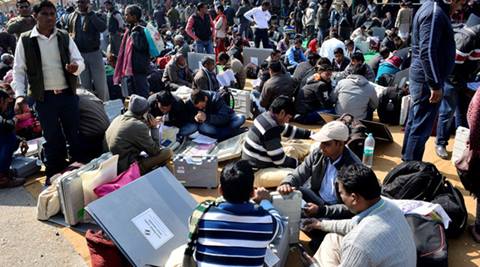


Amid criticism of the Election Commission during the Lok Sabha elections, the Opposition INDIA bloc has continued their criticism in Parliament. Akhilesh Yadav of the Samajwadi Party stated that he does not trust EVMs even if he wins all 80 seats in Uttar Pradesh, while Congress's K C Venugopal called the ECI a "frontal organization" of the BJP. RJD's Manoj Jha also questioned the credibility of the ECI, comparing it to the village head in the popular TV series "Panchayat". The Opposition had previously targeted the EC over allegations of "faulty" electoral rolls and delay in turnout data, with the CEC stating the result was a vindication of the poll panel's impartiality.
Opposition's Persistent Criticism of the Election Commission of India
The Election Commission of India (ECI) has come under fire from the opposition parties during the recently concluded Lok Sabha elections and beyond. Here's a comprehensive overview of the mounting criticism and its background:
Background:
The ECI is a constitucional body responsible for conducting free and fair elections in India. However, in recent years, its impartiality has been questioned by various political parties.
Current Criticism:
Opposition's Statements:
ECI's Response:
In response to the allegations, the CEC (Chief Election Commissioner) has maintained that the ECI is an impartial body and that the election results are a vindication of its fairness. The ECI has also explained the reasons for the delay in releasing turnout data.
Top 5 FAQs and Answers:
1. Why is the opposition criticizing the ECI? Answer: The opposition is criticizing the ECI over allegations of EVM tampering, electoral rolls discrepancies, and delay in turnout data.
2. Has the ECI responded to the allegations? Answer: Yes, the CEC has maintained that the ECI is impartial and that the election results are proof of its fairness.
3. Are there any instances of past criticism of the ECI? Answer: Yes, in the past, the ECI has been criticized for its handling of elections in various states, raising questions about its neutrality.
4. What are the implications of the opposition's criticism? Answer: The criticism could undermine public confidence in the electoral process and lead to demands for electoral reforms.
5. What measures can be taken to address the concerns raised by the opposition? Answer: Strengthening the independence of the ECI, increasing transparency in electoral processes, and addressing concerns over EVM security are some potential measures to address these issues.
Conclusion:
The opposition's persistent criticism of the ECI is a serious matter that requires careful consideration and attention. It is essential to uphold the integrity and independence of the electoral process to ensure a fair and democratic election system. The ECI must continue to address the concerns raised and work towards maintaining public trust in the electoral system.

Union Home Minister Amit Shah spoke at the inauguration of the 60th DGsP/IGsP conference in Raipur where he stated that Naxalism in India will be fully eliminated before the next conference. He also highlighted the government's efforts in strengthening the security grid and providing permanent solutions to long-standing national security challenges. Shah emphasized the importance of intelligence and collaboration with agencies to tackle drug trafficking and organized crime. He also mentioned the strengthening of India's policing framework, making it amongst the most modern globally.

In a recent Q&A session, Professor Michael Clarke addressed the impact of a leaked call between Donald Trump's envoy and Russia on peace talks. He also discussed Putin's desire for a great legacy, which has led to a lack of pragmatism. According to Clarke, approximately 4,000 main battle tanks and 30,000 pieces of armoured equipment have been destroyed in the conflict, with Russia focusing on building more complex modern tanks. Don't miss out on these insightful answers from the expert.

Following his party's disappointing performance in the recent Bihar Assembly election, politician Prashant Kishor has raised concerns about the voting results, stating that they did not align with the public sentiment he witnessed during his campaign. Despite this setback, Kishor remains determined to build a stronger political organization and continue engaging with the public in preparation for future elections. He also addressed criticisms of his role as an election strategist, reminding critics that one loss does not define his political future.

Indian government under the leadership of Prime Minister Narendra Modi has introduced four new labour codes aimed at protecting the rights and well-being of 40 crore workers across the country. Union Minister Mansukh Mandaviya has hailed the move as transformative and a major step towards ensuring the welfare of the workforce. The new codes bring in much-needed changes such as formalisation and transparency through appointment letters, and universal social security coverage for all workers including gig and platform workers.

In Uttar Pradesh's Lakhimpur Kheri, a police constable is in hot water for allegedly forging a court order to clear his name in an old case, with the intention of securing a promotion. The fabricated document surfaced during an internal investigation, prompting authorities to file a fresh case against the constable. This incident adds to the growing issue of corruption and misuse of power within the police force.

The Supreme Court has directed the formation of a Special Investigation Team (SIT) to conduct a fact-finding inquiry against Vantara, an animal rescue and rehabilitation center in Gujarat, following allegations of non-compliance with laws and acquisition of animals. The SIT, headed by former apex court judge J Chelameswar, will also look into reports of irregularities and complaints from NGOs and wildlife organizations. Vantara has assured full cooperation to the probe and reaffirmed their commitment to animal welfare.

The ongoing family feud within the Rashtriya Janata Dal (RJD) continues to escalate as three more daughters of party patriarch Lalu Prasad Yadav have left the family residence in Bihar's capital Patna. This comes just a day after another daughter, Rohini Acharya, publicly denounced the family and quit politics following the party's poor performance in the recent elections. Amidst allegations of insults and mistreatment, the saga continues to unfold within the Yadav family.

In a special lecture series in Bengaluru, RSS chief Mohan Bhagwat emphasized on the Hindu identity as a responsible and proud son of Bharat Mata. He urged the Hindu society to come together and share the message of 'Vasudhaiva Kutumbakam' with the rest of the world. Bhagwat also recalled the RSS founder and its journey of facing opposition and growth through dedication and sacrifice of its volunteers.

As the West Bengal Assembly elections near, the political battle between Bharatiya Janata Party (BJP) and Trinamool Congress (TMC) has intensified on social media. Following the BJP's victory in Bihar, the party declared its hopes to defeat TMC in Bengal on a popular platform, while TMC leader Kunal Ghosh responded with a proverb highlighting the BJP's potential failure in Bengal. Despite BJP's confidence, TMC remains unfazed and asserts their strong hold in the state.

Congress leader and Leader of Opposition in Lok Sabha, Rahul Gandhi, was criticized by BJP's Shehzad Poonawalla for going on a jungle safari in Madhya Pradesh's Satpura Tiger Reserve instead of focusing on the ongoing Bihar elections. Gandhi had earlier claimed that "vote theft" had taken place in several states, including Madhya Pradesh. BJP's Poonawalla mocked Gandhi's "priorities" and referred to him as the "Leader of Paryatan and partying."